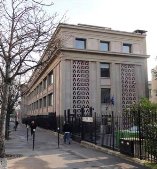The International Court of Arbitration is one of the oldest
international dispute resolution organizations in the world. It was established in
1923 by the International Chamber of Commerce, and still functions as a part of
the operations and activities of that organiation. The “Court” as it is simply
known, is located in Paris, France. A former French Minister of Finance,
Etienne Clematel, provided the leadership for its creation.
The Court is not actually a dispute resolution tribunal. It
was established and engages in the following activities in support of its
primary purpose of assisting parties in the establishment and conduct of
arbitrations. It has outlined the kinds of services its provides, as follows:
- Fixing the place of
arbitration
- Assessing whether there is a prima facie ICC
Arbitration agreement
- Taking certain necessary decisions in complex
multi-party or multi- contract arbitrations
- Confirming, appointing and replacing
arbitrators
- Deciding on any challenges filed against an arbitrator
- Monitoring the arbitral process from the
filing of the request for arbitration to the notification of the
final award, to ensure that the arbitration proceeds in accordance
with the Rules and with the required commitment to diligence and
efficiency
- Scrutinizing and approving all arbitral
awards, in the interests of improving their quality and
enforceability

 International
Judicial Monitor
International
Judicial Monitor